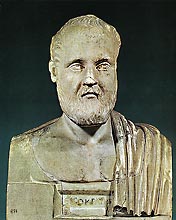

A fundamental characteristic of democracy was the freedom guaranteed by law, discernible as both political and personal freedom.
|
A significant component of freedom was freedom of speech, so-called parresia. It was the right of every citizen to speak out at political meetings especially in the Assembly of Citizens, just as it was his right to express his opinions without fear. In an oral civilization where speech was the dominant mode, the influence of a politician was measured by his powers of persuasion. During the |
 |
 |
 |
|
| |
|||
| |||